#conversos
Explore tagged Tumblr posts
Text
When I was in school I went to a friend's house to work on a project on a Friday afternoon. At about 6 or 6:30 when the sun was about to set her mom called us over to the livingroom. She lit two candles with my friend and then they proceeded to put the lit candles inside of a little cupboard so no one could see them. Me, a young jewish teenager asked her, my catholic friend, why they did that and she shrugged, said it was a family tradition to bring peace and prosperity, that the women of the family did it every friday evening and then hid the candles. They were very catholic, so I bit my tongue and we went back to her room to study.
This is just one of many, many, crypto jewish traditions that still exist in my hometown of Medellín, Colombia and I want to share a little bit about them with you.
Medellín is the capital city of a region called Antioquia and it is currently the second biggest city in my country. Now the weird thing about my region and my city more specifically is that it is in the middle of fucking nowhere, like we are in a valley in the middle of the andean mountains and it would take over two weeks by river, horse and river, and dunkey and mule to even get here before the invention of cars or trains.
Now Medellín was founded over 400 years ago, and families had been coming to the region for way before then, so that means that for centuries getting to my city from the sea or from the other big cities in the country was incredibly hard. This was by design, because Medellín itself was founded by about 28 families and we know for a fact that alteast half of them were crypto jews hidding from the Spanish Inquisition, and both before and the foundation more and more jewish families arrived to the region.
This is a known fact, the DNA of the people from the region has a lot of sepharadic jewish mixed in there. Early Colombian literature dating up to the 1845 would call the people of my region the Neogranadine Jews or the Colombian Jews. But because they were crypto jews the religion and most of the traditions were lost during the 400 years that have passed, now over 90% of the population is catholic and don't really know about their origins.
But some things stuck. And I want to tell you about them.
On the 7th night of December there is this pre-christmas festival called "El día de las velitas" or the little candle night that started and was unique to Antioquia. It's supposed to commemorate the candles that people had in the streets and the windows on the night Jesus was born and that helped Mary and Joseph to find their way. Do you know how this unique festival is celebrated in my city? People take to the streets to light candles, small colorful candles that they put in wooden planks or directly on the streets, it's the night that people decorate and turn on the christmas lights and it is so important and popular that we have an actual day off on the 8th of december.
Let me show you a few pictures

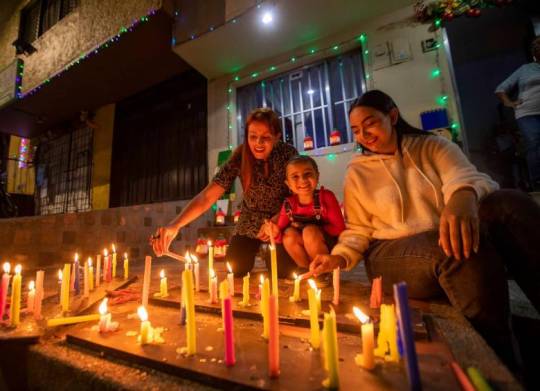
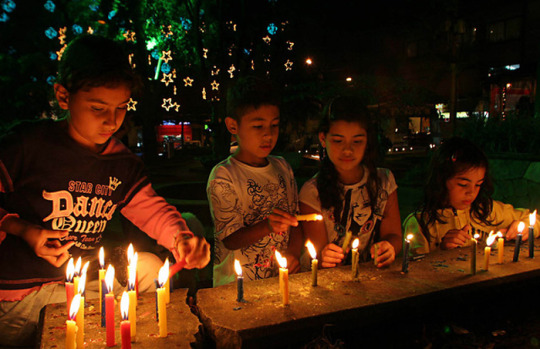
I don't think I need to explain this one. Even most goyim will know about Hannukah. But it is the weirdest thing when the dates coincide and we are all lighting candles together.
My dad was in the Jewish community board and we needed to rent a place to put our jewish daycare. They found this beautiful old house that had belonged to a family in colonial times but needed a little TLC. We had them remove some wooden floors because they were too old and rotting and found a huge Magen David made out stones in the center of the floor. The house also happened to have two separate kitchens and a mikveh or immersion bath in one of the rooms. These a very traditional things that colonial houses have in my region.
My grandmother converted to Judaism so I have a side from my family that is 100% from here and didn't arrive during the 20th century. I had the pleasure to meet both of my great grandparents from that side though they died when I was young. My grandma tells me that my greatgrandmother used to have one of these immersion baths in her house when she was growing up. Women were supposed to bathe in them after their periods had ended, my catholic great grandmother respected the mikveh traddition more than I ever have.
(I wish I had photos from that specific house but this happened over ten years ago, I'll show you some immersion baths from a different colonial houses that are also in my city)
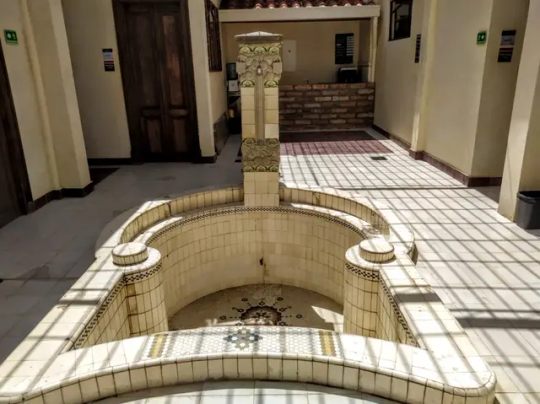
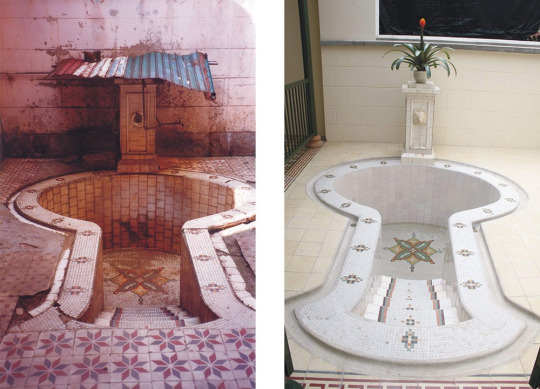
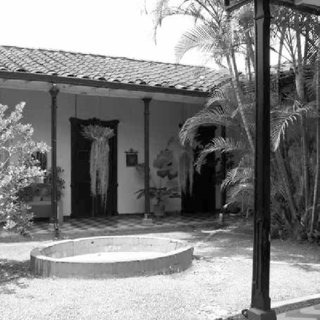
Now how about we talk about traditional clothes. I'm sure most of you have heard of Ponchos, which are traditional in the Andean region, well the one from Antioquia is a little different and it's always supposed to be worn with a hat. Let's see if you can spot what I mean.
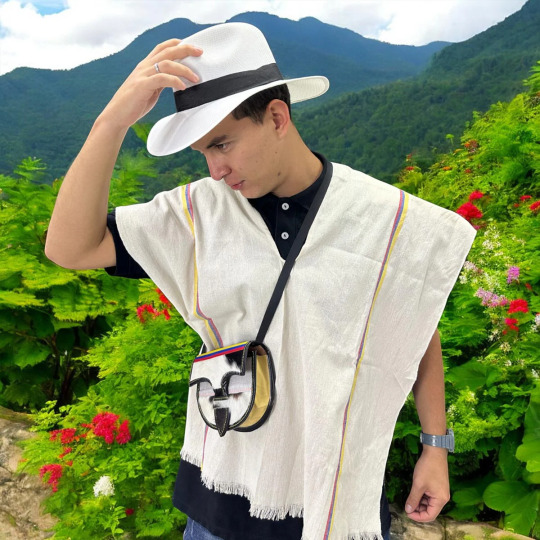
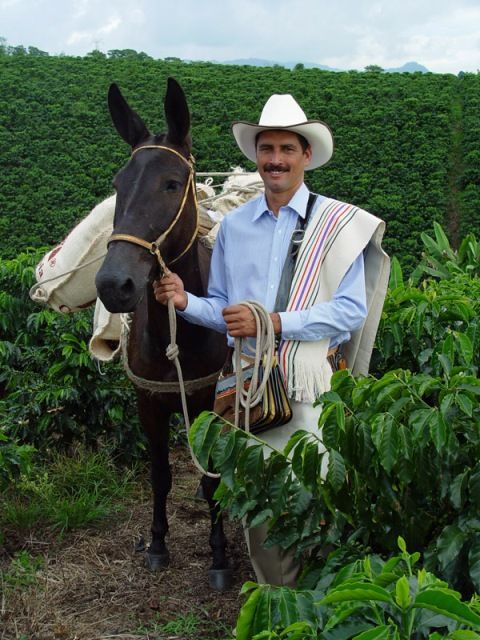
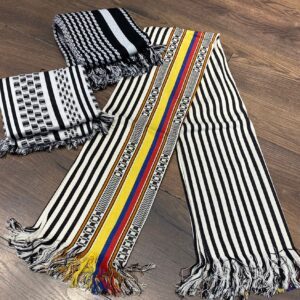
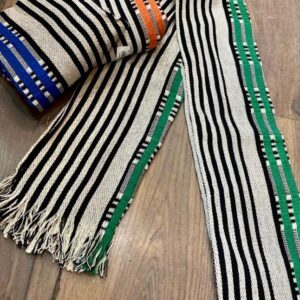
A few years ago Spain decided to grant citizenship to the descendants of the Jewish people that they had exiled in 1492. To get it you had to prove through family trees that your family had been Jewish. My city got the most ammount of passports out of everyone in the world, more than Israel. I could have applied from both my family that came from Egypt in the 20th century (we still have the keys to our house in Spain) or through my catholic side, as both of my grandmother's last names applied. I didn't but I could have.
I don't really know why I decided to finally write this post. I have so many more stories. I just think it's both incredibly sad that so much Jewish culture and people were lost but also it's a little heartwarming to see what survived even centuries down the line.
#it took me years to decide to finally write this because i didn't want to put where i live out on the internet#but fuck it#i still don't know how i feel about this#it's a bit of mourning what could've been and a bit of look a this isn't it neat#there is so much more to say about this topic but the post is too long#like how a lot of jews changed their last name to “Rojas” which spelled backwards means “lizcor” or to remember and they still forgot#or how there is a movement of reclaiming the jewish roots we have three re-emerging jewish communities in our city#one of which already converted fully and they are WAY more obvservant than my regular traditional community#crypto jews#conversos#jumblr#jewish#jews#judaism#jewish history#colombia#medellin#lationamerica#latin america#south america
750 notes
·
View notes
Text
The Chuetas of Palma de Mallorca
🇪🇸 Los Chuetas de Palma de Mallorca son los descendientes de judíos conversos que enfrentaron persecución y marginación durante la Inquisición Española, especialmente en el siglo XVII. En 1691, la Inquisición ejecutó públicamente a varios de ellos, acusados de practicar el judaísmo en secreto. Los chuetas, un grupo reducido de 15 familias señaladas, vivieron durante siglos bajo el estigma y la exclusión social, casándose solo entre ellos para preservar su linaje. Hoy en día, algunos de sus descendientes buscan reconectar con sus raíces judías y, en algunos casos, completar un proceso formal de conversión al judaísmo, en un contexto más libre gracias a la democratización de España en las últimas décadas. Además, la preservación de costumbres familiares como no comer cerdo o la tradición de limpiar la carne antes de cocinarla evidencia la persistencia de prácticas que, aunque no totalmente comprendidas, se mantuvieron a lo largo de los siglos.
youtube
🇺🇸 The Chuetas of Palma de Mallorca are the descendants of Jewish converts who faced persecution and marginalization during the Spanish Inquisition, especially in the 17th century. In 1691, the Inquisition publicly executed several of them, accused of secretly practicing Judaism. The Chuetas, a small group of 15 families, lived for centuries under stigma and social exclusion, marrying only among themselves to preserve their lineage. Today, some of their descendants seek to reconnect with their Jewish roots and, in some cases, complete a formal conversion process, now in a freer environment thanks to Spain's democratization in recent decades. Additionally, the preservation of family customs like not eating pork or the tradition of cleaning meat before cooking reflects the persistence of practices that, although not fully understood, were kept alive for centuries.

#chuetas#Palma de Mallorca#jewish#conversos#jewish converts#Spanish Inquisition#17th century#1691#descendientes#judíos conversos#siglo xvii#israel#familias#judaísmo#descendants#church#iglesia#inquisición#inquisición española#judaism#judío#cultura judía#jumblr#judíos#raíces#jews#sephardic#sephardic jew#sephardic jews#sephardim
7 notes
·
View notes
Text


Nos vamos al medievo.......no, no y no.
0 notes
Text
Le jour d'après la défaite stratégique de l'entité sioniste
Si on prête quelque attention à ce qui se passe en France, chacun peut constater une promotion organisée du Rassemblement National qui va au delà d’une simple banalisation. Les cadres de ce parti fondé par des anciens de l’Organisation Armée Secrète (OAS), nostalgiques de l’Algérie française, ont renoncé à l’antisémitisme et ont en parallèle pris position en faveur du régime sioniste. Un…
View On WordPress
#antisémitisme#Collège Avicenne#Conversos#entité sioniste#Gaza#Hamas#islamophobie#Louis Alliot#Lycée Averroès#Marine Le Pen#Palestine#Rassemblement National#Reconquista#sionisme
0 notes
Text
I'm going to read this a couple more times, think on it, then figure out what my next questions about Hebrew Catholics will be.
I'm starting to realize how narrow my ideas about modern Catholicism are, built mostly on my personal exposure to Italian, Irish, and Polish Catholics in the US. It's easy to forget how much variety of thought and culture the Catholic Church contains.
Thank you, @straynoahide, for taking the time to write this thoughtful introduction and making a small start at chipping away my ignorance of the topic.
what exactly is Hebrew Catholicism and how did it come to be?
Minoritary in all its contexts and obscure to many, I think Hebrew Catholicism is very poorly understood.
As a Hebrew Catholic myself, I wanted to write a longer post to give a perspective that especially modern Jews may not have found before, and address some common questions. I have a more structured post in my bio people can see as well; this is more about our worldview, our thought process, than "official" stuff.
Just some self-awareness for introduction: I know anyone can have a bad experience in mind when Judeo-Christian relations are the topic. I really hope that even if it's a first coming into contact with living Jewish-adjacent Christianity, it can be read with an open mind, in the spirit of interfaith and simply just good will between people of different walks of life - give it a try, to see it for what it really is, not for the problems of communities in the past.
We certainly try to see the opportunities both in the Church and the world at large like this, where understandings are so necessary and prejudice abounds. I invite anyone to do the same in these times when the world pushes for insularity, polarization, and the few profit from burning bridges at the expense of the many.
What I'm covering below:
-Basic definitions, meanings, disambiguation, and contemporary uses of "jewish christian"
-The historical hispanic context; origins among convert communities, resistance to dehebraization and jewish resilience
-The hebrew catholic spirituality as a christian worldview, modern relations with judaism, the jewish political identity in diaspora and the israeli national community, and a mention of specific social issues
-The context of cultural hegemony, religious practices, institutions, and role of Hebrew-speaking Catholics in the future of the Church
-Just some final remarks
Disclaimer: I'm not Jewish and I never claim different. There are (non-Christian) Jewish people I have kinship with, but I find that irrelevant to the post and won't be answering any sort of questions relating bloodlines or personal practices. It would also be a distraction from the point I wanna make and the fact this post is not meant to be argumentative but informative. I oppose the weaponization of identity politics, I think those are things to be discussed between friends in privacy, not as rhetorical devices.
BASIC DEFINITIONS
Right off the start, I wanna emphasize we have nothing to do with culturally protestant "messianic judaism" or Christian Zionism, especially that of Evangelical Protestants.
There are no "Hebrew Catholic" political interests right or left. Even when in Israel, it's not implicitly any less diverse politically than Israeli society itself. Christians aren't inherently liberal or conservative, and in Israel Hebrew Catholics are a natural counterweight to Arab Catholics just like both Israeli Jews and Arab Muslims are different communities, each with their own history in the Middle East.
Confusingly enough, Hebrew Catholics are not (just) Jewish people who came to profess the Christian faith. I'd call that, myself, Jewish Christians, if the person who has this ancestry calls themself that, otherwise just, "Christian".
Hebrew Catholicism is short for "Hebrew-tradition/language" and is about a specific community who came to call ourselves that for a distinct purpose in Church, despite of our own ethnicity/nationality.
So, you can be a non-Jewish Hebrew Catholic, and you can be a Jewish Christian that isn't, even if you're Catholic. The 'Hebrew heritage' is similar to other ethno/national heritages - Catholics see their cultures as something they don't need to have in tension with religious faith. You have German Catholics, Maori Catholics, Native American Catholics, Zulu Catholics, Han Catholics, French Catholics,... an Irish Catholic can practice in an Eastern rite and a person from the Middle East can come to practice in a Celtic rite.
You have catholics from the same heritage as Jews- the same source doesn't mean it's the same now, but its common origin; and as all 'national' heritages, it is a living thing in constant evolution.
It is not a denomination, nor a particular set of theological assumptions about Jews. The Hebrew tradition, the same tradition that led to Rabbinic Judaism, has simply never been foreign to the Catholic Church, but it has been singularly suppressed politically or through virulently antisemitic doctrine by factions.
The first of such was in Early Antiquity with the ostracism of the Jewish Christians - the very first Christians, but then other iterations as well, with the result of the hegemony of Gentile Christianity.
HISPANIC CONTEXT
It's important to realize that while the Jewish diaspora is very geographically and culturally diverse, Hebrew Catholicism is mostly a Sephardi-centric and Hispanic reality, outside of its core in the Hebrew-speaking community of Israel. Keep this in mind if for you Judeo-Christian relations are mostly from an American or Ashkenazi perspective, or you are not familiar with Hispanic culture.
That it has a name now does not mean it has not existed before, just like the yishuv predated revived Modern Hebrew, Medinat Yisrael- the current movement of the XX century is predated by an older reality, one from the Bnei Anusim, even before the times of the Inquisition and the Spanish Empire in Latin America.
From the modern perspective of Judaism as ethnoreligion, someone who "apostatizes" from the religious faith to profess another faith, also becomes disconnected from Jewish peoplehood and would not have any "reason" to "preserve it".
But Catholicism is not a peoplehood, Jewish/Hebrew heritage is part of familial identity or community legacy, and a reality for many, diaspora and in Israel.
ORIGINS AMONG 'NEW CHRISTIANS' / CONVERTS
This is what happened, historically: when Crypto-Jews had children, and their children had children, the Bnei Anusim, these people were still mostly marrying other ethnic sephardi, but of course other people too, who were then in the minority in those communities. Some of these people (almost) entirely lost the Jewish identity, like the Xuetas of the Balearic islands, but others didn't.
Tradition passes down and cannot be removed by law. It becomes a matter of identity - not just about 'hidden rituals' of brit milah, bnei mitzvah or keeping the shabbat, keeping kosher, etc; daily life, prayers, cuisine, stories, ethics; it's about Ladino, about a worldview; it's about resistance to ethnic cleansing in the only way it would occur in each specific context, under the pressure of the Inquisition.
In real-world situations this came down to human resilience, the resistance to ethnocide by people who still were, and are, Zera Yisrael. Crypto-Judaism happening across generations forced communities to reckon with an interpretation of heritage that exist across transcultural boundaries of ethnicity and faith, and also not all 'meshumadim' existed because of force, but in the time there was no notion of individual religious rights within each community.
During the Reformation, which was even later, the European notion of freedom of religion was whether the Prince-Elector of a given territory decided whether everyone was Catholic or Protestant.
Spaniards and Hispano-Jewish/Israeli relations today are marred by I/P and the Inquistion. Before Alhambra, however, ethnic Iberians and Sephardis had 15 centuries of shared life in Sefarad -because Spain as a national polity, then an empire, did not exist as such until the XV century. From the yoke of Roman slavery in early antiquity, to shared dhimmitude in Al-Andalus, we were one multicultural society. Iberians were enslaved by Romans before the Bar Kokhba rebellion.
Judeo-Christian relations have historically been fraught but centuries of cohabitation and coexistence is not nothing. Sephardim are eternally Hispanic people, at least I'll always see it that way, and evidently many of them see this too. Peoplehood, national identity, cultural traditions, are nuanced and complex.
It was the ethnocidal intention of Alhambra to erase Jewishness from the Bnei Anusim- the spirit of Torquemada, who did not want "Jews and Gentiles" sitting in the same table bc they saw Jews as heretics.
This is the result of ethnocide's failure. If we see this centuries later, we get the bigger picture. Preserving a tradition, for people who did not know at the time what would have happened elsewhere, if that tradition would endure anywhere else in the world in any form at all -and it really was the "end of the world" for entire lineages, in the so-called Sephardi holocaust- is something radical and courageous.
They set to erase it. But water flows, Am Yisrael Chai: they refused.
We still refuse to be erased today.
IDENTITY: HEBREW CATHOLICS ARE HEBREW CATHOLICS
Christian belief is post-ethnic and was arguably the first large-scale idea of spiritual universal ethnogenesis, based more on continuity with the Israelite religion's revolutionary idea -Monotheism- than with any polemic. Katholikós itself means universal. Judaism also has evolved around universalist ethical ideas, which predate the Enlightenment, and have shaped ideologies and movements like Hebrew Universalism, the Bnei Noach, etc.
Not all Christian history is in the Crusades and religious wars. In history, the Church's canon law would become one of the first frameworks of European and then international law, with the Papal States acting as mediator between rulers and serving as a framework for things like the promotion of literacy, vaccination, and public universities in the territories under the control of the Spanish Empire.
Some of the earliest frameworks of human rights preceding the French Revolution were always used by people who followed the better nature, to help vulnerable groups in the context of self-interested colonial tyrants, and imperial atrocities, and it's no coincidence many Converts and Sephardim fled from Spain to America, where one of the largest groups remained in Argentina.
Down the centuries, some of the Bnei Anusim came to sincere belief in Christianity, and that's something we all must make peace with, especially antisemitic Christians, but also, people who are, understandably, having anxieties relating the permeability of Jewish Peoplehood after Oct 7, and see in a Christian, a 'Christian Nationalist'. The world in general now has global trends of rising xenophobic and nativistic politics, with many populist leaders that veer towards illiberalism and authoritarianism.
Hebrew Catholics simply do not seek Jewish Peoplehood. It is a misunderstanding of our worldview, or mistaking our goals for political ones. It's not proselytistic, about non-Christians, but about the spiritual inclusion of certain Christians that are already there and will always exist, without forcing the suppression of part of a person.
We have our own communities, liturgy, that eventually will be recognized as its own "Hebrew rite". It's not a large community, but it appeared because the niche had to be officialized, and membership has duplicated in a decade from 500 to 1000 in Israel, being much larger in the (mostly Hispanic) Diaspora.
The Gospel in Hebrew, the Lord's Prayer in Hebrew, in Ladino - these are immaterial heritage of humanity, recited daily in Israel and Diaspora. A language, a shared set of liturgies and customs, that are not the heritage of Rabbinic Judaism, but are still the heritage of Ancient Israel, is worth preserving, too. At least, it is for us.
MODERN RELATIONS AND ISSUES
Whether our theologies overlap or not about 'Jewish Christians', whether Christian faithful Zera Yisrael were Souls at Sinai or not, is not the point of interfaith relations. Interfaith is not about discussing theology, that's for ecumenism within some Council or for a revived Sanhedrin for all I know. The point is temporal, it's belonging in the Israeli family where Jewish identity is political.
While reticence and distrust of Christians is understandable, because Christianity has been an existential threat to Judaism, what an ethnic majority in a mature society does is also become responsible for certain minorities (Christian, Druze, Arab Israelis, etc).
Hebrew Catholics have Jewish families more often than not, live in Israel and participate in community life during national holidays, many have a Jewish identity -individual or familial-, and deserve the same minority rights for religious freedom, freedom of national sentiment as anybody else, based on historical insight. Security and patriotism should never be transactional, imply renouncing one's faith, 'recanting', etc.
When Hebrew Catholics who identify as Jewish Christians speak of 'Hebrew heritage', they know that many Jews (not all! but yes most) don't see them as part of the Tribe because they profess the Christian faith, but would not have this knee-jerk reaction to a pagan or buddhist Jew in our more nuanced modern world.
A plurality of Israeli Jews are secular/hilonim and largely supportive in polls to things like non-religious legislation for marriage, more inclusive High Holiday celebrations for nation-building, etc, but Christianity is the limit of tolerance for a non-negligible amount.
This is becoming I fear, increasingly hard to empathize with for right-shifting Diaspora who have faced the opposite problems and are now facing new waves of antisemitism - they demand elective exclusion out of historically forced inclusion, rather than demanding self-expressive, family-honoring, or community-aware inclusion, out of non-elective exclusion. Resisting dehebraization is not cultural appropriation, it is cultural continuity and heritage.
If you are not Israeli, this is even more important to understand: Israeli society itself is at risk of ethnotheocratic excesses and other democratic malaises, just like a society where any ethnic majority has identitarian extremists.
I'm not personally left-wing, so I'm not here to dictate other peoples' politics, but if you have heard of Kahanists, it's not just that. The behavior and identity of some in Israel is not simply an "intra-community" Jewish issue- draft evasion, say, affects ALL Israelis, including Druze and Christians that serve the country. There are incidents of some Haredi youth spitting at Christians in Jerusalem processions, and not just the pilgrims, but people from historical communities that predate the Crusader states.
When this happens, even supportive authorities sometimes point to European medieval antisemitism as "context". And then, Christophobia itself is not regarded as a real thing. Humbly but assertively - there's no context for hate, this is wrong. I think everyone outside of Israel who is a friend to Israel, and Diaspora, have to understand not every political context is the same, that (Judeo-)Christophobia can become a form of discrimination, and that secularism has democratic value for a reason, especially when the national family includes different races, ethnicities, cultures...
RELIGIOUS PRACTICE AND INSTITUTIONS
Hebrew Catholics are fully Roman Catholic in doctrine.
All rites are Christian, liturgy is in Hebrew in Israel but it's a western rite; the chief authority is the Pope, the sacraments are the seven sacraments, Christology, Trinitology, etc, are all standard Christian Nicene theology. It is not characterized nor promoted by a spirit of proselytism or supersessionism.
What distinguishes Hebrew Catholics is not doctrinal but cultural and spiritual - Hebrew liturgy, calendar, Mosaic traditions, in a way that is in harmony with Catholic theology and worldview.
Specifically, Jewish Catholics don't see themselves as having abandoned Jewish heritage but continued the preaching of Yeshua, who was a historical Rabbi during a time in I century Judea when there were different forms of Israelite religion, one of which then also led to Rabbinic Judaism (the Pharisaic doctrines, not Sadducees either, etc), and Jewish Christianity's relation to later Gentile Christianity was not a given.
Of course this is not literal, just like the national origin mythos of any nation, including Israel, are not meant to be literal (Children of Abraham, etc.), but that's the spirit. And of course if you're not a Christian, you don't have to agree with their self-characterization. But this is what our scripture says - they warned,
"Do not consider yourself to be superior to those other branches. If you do, consider this: You do not support the root, but the root supports you." - Romans 11:18
If you want more in-depth theology regarding this, see why I think Hebrew Catholicism is in fact the best antidote to both antisemitic, (eschatological/political) "philosemitic" and supersessionist problematics inside of the Church.
I can't speak for all Christians, but I can speak for Catholics that since Vatican II and Nostra Aetate, Jewish Deicide was rebuked - I hope the same happens one day to repair the fallout of Supersessionism.
At any rate, Hebrew Catholics live by the reality that the Jewish identity retains theological significance even in the light of Christ, and as such, the concerns of the Jewish community are very much felt as the concerns of our family.
If we had a bigger voice or representation in the church, perhaps something like "Keffiyeh Jesus" would not have happened and more people at the Vatican would understand political antizionism as the insidious form of antisemitism, erasure of Jewish indigeneity it is.
Some of the biggest groups worldwide are the AHC and ROI, many Hispanic ones (especially in Latin America), small but too numerous to count, and the Israeli St James Vicariate associated with the Latin Patriarchate, now held by Pierbattista Pizzaballa, who could in fact become the next Pope. This man asked to be exchanged for all the Israeli hostages of the Simchat Torah Pogrom / Oct 7. This man speaks Hebrew, lives among Jews and Hebrew Catholics, and reads Hebrew media. That's no coincidence.
In Israel, Hebrew Catholicism also serves migrants who are already Catholic integrate, some have Hispanic background (eg Sephardi Argentinians, Filipinos), rather than Arab ethnicity or live in Arab communities. It's adapted to the Jewish cultural context of Israel.
If you hear Hebrew Catholics go to synagogues, well of course. And Jews come to baptisms and funerals in a church. They're attending their cousin's Bar Mitzvah, for example, or staying in touch with friends and relatives and neighbors.
THE CONTEXT OF CULTURAL HEGEMONY AND SOCIAL ISSUES STEMMING FROM EXCLUSION
We understand the history and problems of groups like protestant Messianic Jews, far-right Black Hebrew Israelites, other peoples who want to erase, deny or usurp Jewishness for sectarian, political or identitarian reasons in history and in the Diaspora. Hebrew Catholics don't want to hold a service in a synagogue or host a Seder for Gentile Christians, and we know what a Jew is.
We have our own temples and practices, which if cultural, depend on the family and tradition - it's simply about a framework to accomodate diversity in observance of mosaic traditions, and not about the religious aspect itself. It is not about a "Christian Seder", or about a "Christian Aliyah", or any other such thing.
This is a natural consequence of freedom of conscience: that some Jews will in fact come to believe in Christianity, because Jews are people just like anyone else. I believe in individuals' rights to live free lives everywhere, I don't see a Christian who converts to Judaism as a 'traitor' and I am saddened when the opposite is seen in a similar light, because it's just not honest. That opinion does happen and we get the fallout of the other side picking up the pieces of a fractured humanity. You wouldn't want that for your family or yourself.
Specifically in our communities, many Hebrew Catholics are either spouses or parents to Jewish people, just like some Jews are parents to Christians. Even among entirely assimilated Christian groups, like the Xuetas, from time to time you have people who convert or 'revert' to Judaism, become olim, and decide that's their life path. It's fine.
Israel now is a Jewish-majority society with a Christian minority. Power relations can translate into Judeo-christophobic discrimination and the vulneration of a religious minority's civic rights. I hope that people like Oswald Rufeisen are not rejected in the worst context possible ever again, or that people like David Bogdanowski are given the dignity of a proper military burial, not discriminated in the Jewish democracy while serving their country or fighting and resisting the enemies of life.
I support the Jewish state; the Jewish democracy. I think this is a negative form of still treating Christianity in a centric way it does not warrant or is out of context, when you really have interfaith humanist values, and when you have a society in which being the majority comes with responsibilities. And I just want people to be informed and mindful of those as well, in the middle of all the other issues that no doubt can seem more abundant or pressing.
It's a drop in a sea, I know, but I don't want to pretend I don't care about this because I do, and deeply, as much as I care about antisemitism in general. It's not meant to be a viral post, and we won't change Judeo-Christian relations overnight, but I want to be honest and forthcoming.
CONCLUSIONS
We are the community more closely invested and attuned with the concerns of Jews because most of us read Hebrew and live in Israel, or have close ties with those who do.
While I don't 100% subscribe every theological statement of every other member of the church, just like Jewish Deicide was rebuked, Supersessionism I believe will also be reckoned with. You don't need to believe what we believe, to believe in someone as an ally, and I think we can all use some more hope in the world right now.
From our perspective, someone is Jewish if they're in a Jewish family. There are both Jewish and non-Jewish members and families in Hebrew Catholic communities; what we do is integrate every type of existence without compromising either faith or heritage. Unlike those who treat Christianity as intrinsic apostasy, we believe some Christian souls were at Sinai because they are Zera Yisrael, and that today, these people deserve a place of respect in Israel, and dignity.
Christians will always sit gentiles and jews in the same table. We are all God's children. I pray we keep walking that walk together and understanding each other better every day and that the church still has a role in a better future for all
שבת שלום
13 notes
·
View notes
Text

beating zionism by valorizing your jewish blood thus othering converts who are not blood pure enough
32 notes
·
View notes
Text
i think im fond of him though caus i do have an assimilationist streak in me which is why i also feel like i understand wittgenstein deeply as a person
11 notes
·
View notes
Note
Zu, não sei como te falar isso, mas acompanho sua arte desde os primórdios do fandom de Hetalia (entre 2009/2011, não tenho muita certeza) e, mesmo nunca conversando com você, te considero uma amiga de alma, tipo, pelo tempo acompanhando sua arte, por achar seu traço lindo, seu senso de humor uma graça.
Obrigada por fazer desenhos tão lindos e por ser essa pessoa divertida e engraçada.
Que seu 2025 seja maravilhoso.
(e desculpa se passei uma vibe de stalker, ou algo assim, eu só sou tímida mesmo, e não sei interagir direito com as pessoas)
Aaaawwwwwww Anon ;-; ♥♥♥♥ Obrigada pelas palavras, e por seguir minha arte por tanto tempo!! Realmente esses foram os primórdios.... os anos dourados.... bons tempos lol
Mas que mensagem fofinha~ Eu estou me sentindo meio Bleh sobre minha arte e meus planos pro futuro no momento (acho q é a vibe de fim de ano, eu fico meio em crise no réveillon), então sua ask me deu uma animada. Eu quero continuar desenhando e compartilhando meus desenhos com vocês, então espero que continuem gostando deles ♥
Um 2025 lindo pra você também, Anon!!
#vou ser sincera anon eu nem pensei em stalking até vc mencionar#eu tb sou tímida e sigo pessoas há anos com quem nunca converso então se vc é eu tb sou lol#zureplies
18 notes
·
View notes
Text
Israel ha decidido crear la Academia del Judeo-español/Ladino, un organismo dedicado a preservar y promover el idioma que hablan los descendientes de los judíos expulsados de España en 1492. Esta iniciativa nació a partir de una propuesta de la Real Academia Española (RAE) y busca mantener viva la lengua que los sefardíes han transmitido por generaciones. La ministra de Cultura de Israel, Miri Regev, anunció el compromiso del país para establecer esta academia, que se formalizará en la próxima asamblea de la Asociación de Academias de la Lengua Española (Asale) en Sevilla. Con esta incorporación, habrá 24 academias dedicadas al español en el mundo, reconociendo el legado único del judeo-español/ladino y su importancia histórica y cultural.
Academia Española: Israel acepta constituir la academia del judeo-español/ladino EMETH GOLEM
a través de Academia Española: Israel acepta constituir la academia del judeo-español/ladino
View On WordPress
#judeoespañol#ladino#academia del ladino#preservación del idioma#sefardíes#cultura sefardí#sefarad#israel#reyes católicos#asale#expulsión de 1492#1492#comunidad judía#israelitas#patrimonio cultural#lengua en peligro#sevilla#idioma arcaico#rae#siglo xix#historia de españa#judaísmo#judaism#conversos#judeo-español
4 notes
·
View notes
Note
so, eu tava vendo a entrevista do hansol e agora eu entendi o porquê meu santo bateu com o dele. Ele simplesmente contando os traumas dele como se fosse piada kkkkkkkkkkkkkkkkkkkkkkkk.
eu também sou igualKKKKKKKKKKKKKK
#ꫝ ' solie talks.#tô tentando me esforçar pra parar#juro#minha sorte é que mal converso com outras pessoas#��� ' anonnies da soso.
5 notes
·
View notes
Text
Qualche giorno fa é venuto il tecnico della stufa a pellet. Mi son detto: vabbè conversiamo un attimo mentre lavora, partiamo dalle basi con un "come va la vita?"
Risposta "Eh sai mi sono sposato qualche settimana fa" ah, dico io, bene, auguri "...e mia moglie mi ha tradito il giorno stesso nei bagni del ristorante mentre ancora aveva indosso l'abito da sposa"
Ricordatemi di non conversare mai più
#tra l'altro poi mi han pure detto che non dovevo chiedere che tutti in paese sapevano cos'era successo#qua ancora non hanno realizzato che non converso con nessuno in sto paese#e se converso di sicuro non vado a chiedere#hey chi é stato cornificato questa settimana? aggiornami
3 notes
·
View notes
Note
nina por agora você só está escrevendo com o cast de lsdln e o twink francês ?
porque são as celebridades que estão me dando o gás pra escrever, me despertando interesse, porque são novos no meu mundinho de fã. Escrever com as mesmas figuras o tempo todo fica chato às vezes, e eu vivo de momentos😔🤌
#mas eu escrevo e converso sobre outros tb especialmente fora do kpop por enquanto#eu escrevo com kpop desde 2019 preciso de um break#não quero ser rude nem nada mas tb tem vários outros blogs que escrevem com idols por exemplo não é como se fosse fazer muita falta#enfimmmmm#🤗#[💌] fala comigo bebê
7 notes
·
View notes
Text
Sinto que estou unida com Deus tão intimamente como uma gota de água se une com o imenso oceano. Diário 411.
#Jesus#unida#Deus#água#oceano#santa#Missa#vejo#Senhor#alma#sinto#presença#olhar#divino#converso#dizer#palavra#deseja#coração#faço#agrada#amoO#loucura#amada#interiormente#sintome#feliz#sei#breve#suportaria
0 notes
Text
WOMS: The Familiar
I’m back! (Sort of.) Realising being away has done wonders for me, so not wanting to tempt fate, I’m not back on social—yet—but the weekly blog posts are! To start off 5785, and in honour of #spookyseason, it’s my #bookreview of Leigh Bardugo's latest tragic love story in The Familiar. Click below to read how it surprised me! #Jewishfantasy
I hadn’t planned on reading The Familiar because the cover creeped me out a bit and I wasn’t sure if it would be too dark for me. How wrong I was. I’m so glad my friend persuaded me to give this a read because it was a heartbreaking, beautiful love story, one only Leigh Bardugo could have written. Though I haven’t read her new Ninth House series, I have read all but one of Bardugo’s Grishaverse…
#books#converso#fantasy#Inquisition#Jewish#Jewish Fantasy#Judaism#Leigh Bardugo#magical realism#musing#Musings#reading#survival
1 note
·
View note
Text
faz uns 3 dias que eu venho buzinando no ouvido da minha mãe e enchido o saco no tumblr sobre filmes mas é porque eu não tenho amigos cinéfilos então todo mundo meio que vai ter que aguentar

#e sobre livros tambem mas ai eu nao converso com a minha mae ela nao tem muita paciência entao o skoob meio que cumpre essa parte!#mirella says#text
0 notes
